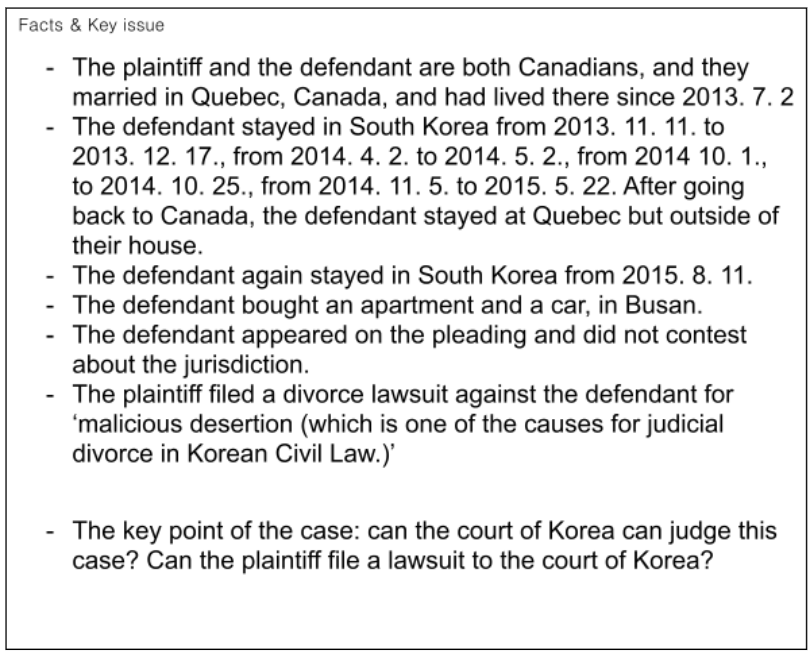It depends on the case, but basically YES, according to the Supreme Court Decision 2017Meu12552, Decided February 4, 2021.

What Is Jurisdiction?
Jurisdiction is the authority of a sovereign power to govern or legislate a certain area. Simply saying, it is a matter of ‘which court is to rule this case.’ If a certain court has jurisdiction, it means that the certain court can judge a certain case, so you can file your lawsuit to the certain court. The jurisdiction of a civil lawsuit is decided by Korean Civil Procedure Act. To enhance the judicial economy and ensure the defendant’s right to defense, Korean Civil Procedure Act has some rules such as Article 2 and 3.
A lawsuit is subject to the jurisdiction of a court at the place where a defendant’s general forum is located.
Article 3 (General Forum of Person)
General forum of a person shall be determined by his/her domicile: Provided, That where the person has no domicile in the Republic of Korea or his/her domicile is unknown, it shall be determined pursuant to his/her residence, and if the residence is unfixed or unknown, it shall be determined pursuant to his/her last domicile.
A simplified version of Article 2 and 3 is as follows: the court that you can file a lawsuit is the nearest court (not always though) to the defendant’s address (domicile: official address). Why? From the eyes of the law, this is one of the good ways to enhance the efficiency of litigation (it is called ‘judicial economy’) and to guarantee the defendant’s right to defense. The closer the distance between a court and a defendant, the more convenient for the defendant to participate.
Similarly, from Article 2 to 25, Korean Civil Procedure has various rules to determine the jurisdiction, and they all have the same purpose – a quick, easy, and efficient civil suit.
The Jurisdiction Regarding Family Litigation
Under similar principles, the jurisdiction of family litigation is decided. Family Litigation Act Article defines the jurisdiction regarding marriage and divorce as follows:
Litigations over a nullity or revocation of marriage or divorce, or over a judicial divorce shall be subject to the exclusive jurisdiction of family courts under the classification of the following subparagraphs:
-
-
- When the married couple has a general forum in the district under jurisdiction of the same family court, the family court;
- When a general forum of either side of the married couple exists in the district under jurisdiction of the family court wherein they had the last common domicile, the family court;
- In cases which does not fall under subparagraphs 1 and 2, when either side of the married couple institutes a litigation against the other party, the family court in the location of a general forum of the other party; and when the litigation is against both of the married couple, the family court in the location of a general forum of one of them.
-
A simplified version is as follows:
A married couple can divorce in the family court of their domicile. Or they can divorce in the family court of their last common domicile. If they do not have any last common domicile, then they can divorce in the family court of the defendant’s domicile.
Jurisdiction For An International Divorce Lawsuit
At this point, you may have a question. I’m a foreigner, and I live outside of Korea, so I don’t have a domicile. Do these rules apply to me? Do I still have jurisdiction in Korean court? The answer is YES, according to the Supreme Court Decision 2017Meu12552, Decided February 4, 2021.
For foreigners to conduct litigation, what matters in the first place is the Act On Private International Law. The Act On Private International Law Article 2 defines as follows:
Article 2 (International Jurisdiction)
-
-
- In case a party or a case in dispute is substantively related to the Republic of Korea, a court shall have the international jurisdiction. In this case, the court shall obey reasonable principles, compatible to the ideology of the allocation of international jurisdiction, in judging the existence of the substantive relations.
- A court shall judge whether it has the international jurisdiction in the light of jurisdictional provisions of domestic laws and shall take a full consideration of the unique nature of international jurisdiction in the light of the purport of the provision of paragraph (1).
-
In a nutshell, ‘substantial relation’ to South Korea is required in order to file a lawsuit in Korean court. Then, what is a substantial relation? How is it decided? Let’s take a closer look at this 2017Meu12552 case.

In this case, the plaintiff and the defendant are both Canadians, and they married in Canada in 2013. However, the defendant started living apart from the plaintiff. The defendant started living in South Korea, bought a house and a car in Korea, while the plaintiff was still living in Canada. Leaving one’s spouse alone can be the reason for judicial divorce according to Korean civil law (‘malicious desertion’).
Article 840 (Causes for Judicial Divorce)
2. If one spouse has been maliciously deserted by the other spouse;
After a few years of the ‘desertion‘, the plaintiff had filed a suit for divorce and division of property claimed with the divorce. The defendant was still living in Korea (while not having a domicile).
Korean Supreme court had decided that Korean Court has jurisdiction over this case, as the dispute is substantively related to the Republic of Korea for the following reasons.
First, the Act on Private International Law Article 2 is also applied to cases of Family Litigation.
Second, the “substantial relations” regarding the family litigation is determined by the elements as follows: jurisdictional provisions of domestic laws; the nationality, domicile, or habitual residence of a party; the location where factual basis, which becomes the cause of the dispute, is formed (e.g. the location where the cause of the revocation of marriage or divorce occurred, the place in which the child lives where the right to child custody comes into question, the location of the corresponding property where the main issue is the division of the property, etc.).
In this case, the cause of the divorce (malicious desertion) was in South Korea, and the property to be divided (houses, cars, etc.) was also located in South Korea. For a case like this, it would be much easier and quicker for the plaintiff and the defendant to conduct a lawsuit in the court of Korea. If the lawsuit is progressed in Canadian court, it would be more difficult and troublesome for both plaintiff and defendant to conduct a divorce suit. Therefore, the ‘substantial relations’ to Korea were affirmed, and the Supreme court of Korea decided that the court of Korea has jurisdiction.
In conclusion, in order to file a divorce suit against your spouse, you do not have to be Korean nor to have a domicile in Korean. On the other hand, if the cause of your judicial divorce or your property to be divided is in Korea, then you can file a divorce lawsuit in the court of Korea, for the efficiency and convenience of your lawsuit.
If you have trouble filing a divorce lawsuit in Korea, Seoul Law Group is here to help you.

